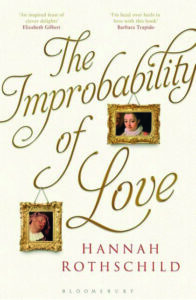 A Novel published by Bloomsbury 2015 by Hannah Rothschild,
A Novel published by Bloomsbury 2015 by Hannah Rothschild,
‘Art follows power. Just as soldiers hang medals from their uniforms, the rich hang paintings on their walls.’ (p271)
As the first woman to Chair the National Gallery, Hannah Rothschild is well-positioned to write a novel centred around the secret machinations of power in the art world. The dark underbelly of the art world is laid bare in impishly satirical fashion in this surprising book, part chick lit, part thriller and part philosophical inquiry. The title speaks of love, but the overarching theme is the raw urge to possess at all costs.
Everyone wants the lost Watteau study The Improbability of Love, imagined by Rothschild. Everyone, that is, except its owner, brokenhearted chef Annie. She buys it in a junk shop on a whim, a gift for a deadbeat date who fails to turn up for the lavish birthday dinner she has prepared. This rejection compounds Annie’s recent heartbreak, she finds solace in the mysterious depths of the painting’s clouded surface.
Consistently erudite and informed, the author makes the lost painting work as a metaphor for the obsessive drive to acquire. The narrative takes many ambitious turns, the most gripping of which is the sub-plot concerning the large-scale theft by Hitler’s notorious ‘Art Squad’ of valuable paintings belonging to Jewish families. Rothschild provides historical and art historical information with erudition, and her prose can be mouthwatering.
Rothschild’s background as a documentary film-maker is very evident here. The narrative is languorous as a movie, the observations beady-eyed and highly focussed, and the scope is huge (spanning two centuries and two continents).
Beguilingly given its own voice, the little painting is full of stories from the private lives of its rich and famous owners. The strange patois in which it speaks is the result of its travels and the company it has kept. Quite the spoiled pet, the painting despairs of its most recent companions in the junk shop.
The cast of characters is impressive and there’s humanity in the prose, a sense that the characters’ inner lives are lovingly examined to better examine the full range of human emotion. We see a complex relationship between an active alcoholic and her adult daughter, various love affairs, dysfunction within a powerful art world family whose members seem to have scoured themselves from within of all human empathy, all brought together by the coveted painting.
‘We are all complicit in a dance with power’, art historian Abufel tells us, chillingly. Rapper M Power Dub-Box doesn’t get the art world at all (‘…dumb prices. Dumb people’), but he’s still determined to be in on the action when the painting goes to auction.
It’s a study of the dark side of the art world, but also a study of human greed, of the vexing question of value, and of the many things that art has been made to mean. The tacit association of an aesthetic sense with innate human goodness is laid bare and revealed as deeply flawed. ‘… the Medicis, slave traders, marauding rulers and others […] understood that art had the power to whitewash reputation’. Except this is something art can never do. The Improbability of Love unmasks the improbability of the powers ascribed to painting – the power to heal, to save, to cover over wrongdoings.
Dr. Angeline Morrison
Dr. Angeline Morrison is a composer, songwriter and vocalist and Art Historian, she currently lectures at the Open University
Volume 30 number 3 January / February 2016 p 35
